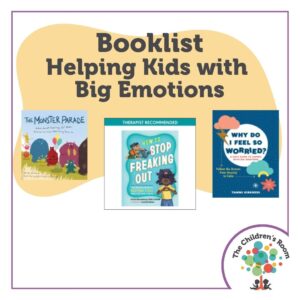15 Nov Booklist: Helping Kids with Big Emotions
 Just like adults, kids can have very big emotions, and an important part of emotional development is learning how to identify these emotions. For kids, it can be scary and isolating when they feel big emotions and don’t understand how emotions can impact how we feel physically or that emotions will change over time. The following books are listed in increasing order of age and reading level and cover how to identify emotions and calming strategies to move past the scarier ones.
Just like adults, kids can have very big emotions, and an important part of emotional development is learning how to identify these emotions. For kids, it can be scary and isolating when they feel big emotions and don’t understand how emotions can impact how we feel physically or that emotions will change over time. The following books are listed in increasing order of age and reading level and cover how to identify emotions and calming strategies to move past the scarier ones.
For younger readers
The Monster Parade by Wendy O’Leary
This is a good picture book for the youngest readers, helping them to understand the names for different emotions, how they can affect how you feel, as well as coping strategies for processing big emotions. This book doesn’t go into much detail about what causes big emotions, but provides a solid starting point for children to understand emotions.
This picture book introduces emotions and provides prompts for caregivers to have a discussion with their children about processing anxiety and providing reassurance that everyone deals with anxiety and that there are techniques for calming anxious thoughts.
Don’t Sweat It: How to Navigate Big Emotions by Sloane Hughes
This colorful book introduces the concept of emotions, how it can impact us physically, and basic techniques to deal with them. It does not go into much detail, but does provide some brief pointers for shorter attention spans.
Sometimes When I’m Worried by Deborah Serani, Psy.D.
This picture book talks about the many different ways that worry and anxiety can make us feel, as well as techniques children can use to cope with the different symptoms of anxiety. The end of the book provides a brief guide for caretakers to help them recognize signs of anxiety in children and how to start conversations to help anxious children.
For older readers
The Worry (Less) Book: Feel Strong, Find Calm, and Tame Your Anxiety! by Rachel Brian
This graphic novel provides a visual narrative to help children understand the physical causes and effects of anxiety and how to recognize anxiety in themselves, as well as physical and mental self-care exercises to combat anxiety.
This book introduces the concepts of how emotions are governed by physical processes and what different chemicals and parts of the brain are involved in different emotions. Covering a range of emotions including sadness, anxiety, and anger, some techniques for processing each emotion are provided.
How to Stop Freaking Out by Carla Naumburg
This book specifically focuses on how to be self-aware of our emotions and techniques for combatting or recovering from when emotions get overwhelming and lead to an outburst. This book works best for older children.
Using a flowchart style of progressive questions, this book helps kids to analyze their emotions and presents a number of potential activities or practices they can utilize to alleviate anxiety and stress. This book offers a good range of activities that children can practice to ease anxiety and move towards emotional self-regulation. It does require a good amount of attention and patience to work through all of the questions, but it is good for situation-by-situation problem-solving.
Written by Amy R., Youth Services Library Assistant



